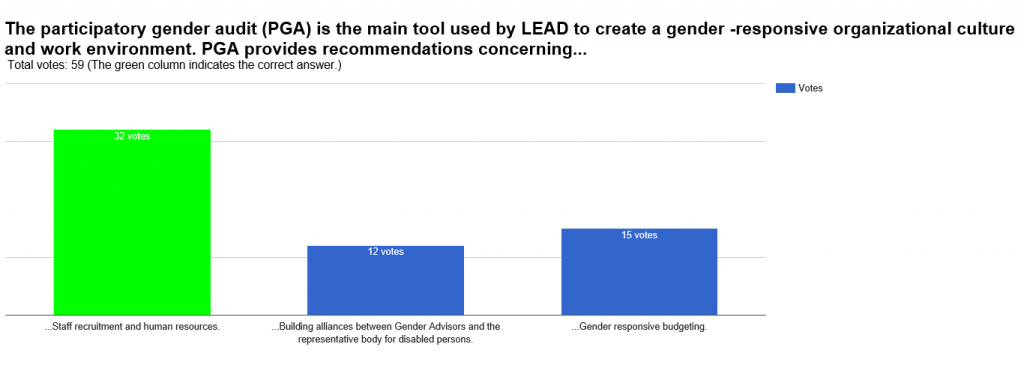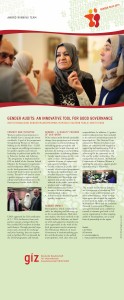Women’s political participation in the Middle East is among the lowest worldwide. A goal of the programme Strengthening Women in Decision Making in the Middle East – LEAD is to support an enabling environment for gender equality and women’s leadership in political and public life in Palestine, Jordan and Lebanon. Focusing on the local governance level the programme works with local institutions and civil society. The main tool used to create a gender-responsive organizational culture and work environment is the Participatory Gender Audit (PGA). LEAD supported the ILO certification of 5-7 PGA facilitators from each partner country, amongst them the first certified PGA-auditors in Jordan and Lebanon. Through practical experience and a network for exchange and joint learning, they are empowered to facilitate PGA on demand for the LEAD programme and beyond.
Gender Responsiveness – a quality feature of our work
PGAs initiate multi-layered sustainable change: from perceptions and attitudes to systematic institutional change by embedding gender principles and approaches into formal structures and processes, by looking at and providing recommendation on following themes: Gender equality issues within work units’ context, existing gender expertise in terms of competence and capacity building; gender inclusion in public institutions’ objectives and programs during work implementation and selection of partner organizations; iformation and knowledge management and gender equality as reflected in the public institutions’ products and overall image; staff recruitment and human resources, decision making, and organizational culture; achievements in the field of gender equality integration.
Municipalities, which completed the audit, are adopting and following-up on the recommendations. Male decision makers, who were involved in the Gender Audits in Palestine, are familiar with and supportive of gender sensitive approaches in the work of the local government and at ministries. The Palestinian Ministry of Local Government is institutionalizing gender unit/focal points in the audited municipalities, with clear roles and responsibilities. In addition, 12 gender-sensitive indicators have been included in the ministry’s monitoring system for municipalities. The National Commissions for Women in Lebanon and Jordan are committed and engaged in supporting and implementing PGA in national and local institutions, and advocating for the systematic use of the tool by public institutions. The main partner in Lebanon, the National Commission of Lebanese Women is applying the concept to support gender mainstreaming in Ministries. The trained facilitators in Lebanon are in the process of conducting PGA in three major political parties with other commissioners. Other development agents also adopted the approach in their work. In Jordan, the Ministry of Municipal Affairs and the Jordanian National Commission of Women, a semi-governmental actor, collaborate towards a common goal with a civil society organization in three ongoing audits of municipalities, not a usual form of partnership in the region.
Full information: 2018 EN GenderAward RollUp MENA LEAD
Competition entry: 2018 EN Project Documentation Regional Approach To Institutionalize Gender Mainstreaming
Have a look at the pictures of the Gender Slam Team performing:
Have a look at the results of the second screen survey during the Gender Award Ceremony:
GIZ staff may download the recordings of the Gender Award and the Gender Slam contribution.
Contact details:
Luke McBain, Palestine
+972 592 168 301
luke.mcbain@giz.de
GIZ LEAD

 GIZ Gender Website
GIZ Gender Website




